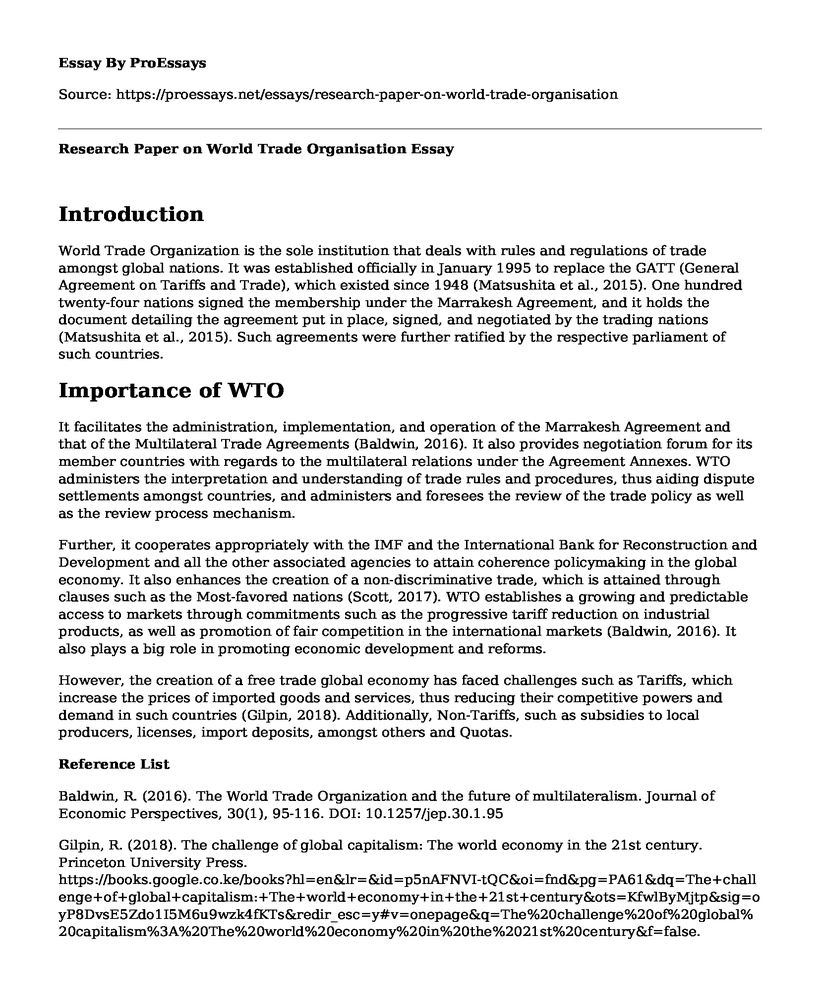Introduction
World Trade Organization is the sole institution that deals with rules and regulations of trade amongst global nations. It was established officially in January 1995 to replace the GATT (General Agreement on Tariffs and Trade), which existed since 1948 (Matsushita et al., 2015). One hundred twenty-four nations signed the membership under the Marrakesh Agreement, and it holds the document detailing the agreement put in place, signed, and negotiated by the trading nations (Matsushita et al., 2015). Such agreements were further ratified by the respective parliament of such countries.
Importance of WTO
It facilitates the administration, implementation, and operation of the Marrakesh Agreement and that of the Multilateral Trade Agreements (Baldwin, 2016). It also provides negotiation forum for its member countries with regards to the multilateral relations under the Agreement Annexes. WTO administers the interpretation and understanding of trade rules and procedures, thus aiding dispute settlements amongst countries, and administers and foresees the review of the trade policy as well as the review process mechanism.
Further, it cooperates appropriately with the IMF and the International Bank for Reconstruction and Development and all the other associated agencies to attain coherence policymaking in the global economy. It also enhances the creation of a non-discriminative trade, which is attained through clauses such as the Most-favored nations (Scott, 2017). WTO establishes a growing and predictable access to markets through commitments such as the progressive tariff reduction on industrial products, as well as promotion of fair competition in the international markets (Baldwin, 2016). It also plays a big role in promoting economic development and reforms.
However, the creation of a free trade global economy has faced challenges such as Tariffs, which increase the prices of imported goods and services, thus reducing their competitive powers and demand in such countries (Gilpin, 2018). Additionally, Non-Tariffs, such as subsidies to local producers, licenses, import deposits, amongst others and Quotas.
Reference List
Baldwin, R. (2016). The World Trade Organization and the future of multilateralism. Journal of Economic Perspectives, 30(1), 95-116. DOI: 10.1257/jep.30.1.95
Gilpin, R. (2018). The challenge of global capitalism: The world economy in the 21st century. Princeton University Press. https://books.google.co.ke/books?hl=en&lr=&id=p5nAFNVI-tQC&oi=fnd&pg=PA61&dq=The+challenge+of+global+capitalism:+The+world+economy+in+the+21st+century&ots=KfwlByMjtp&sig=oyP8DvsE5Zdo1I5M6u9wzk4fKTs&redir_esc=y#v=onepage&q=The%20challenge%20of%20global%20capitalism%3A%20The%20world%20economy%20in%20the%2021st%20century&f=false.
Matsushita, M., Schoenbaum, T. J., Mavroidis, P. C., & Hahn, M. (2015). The World Trade Organization: law, practice, and policy. Oxford University Press. https://books.google.co.ke/books?hl=en&lr=&id=bralCgAAQBAJ&oi=fnd&pg=PP1&dq=The+World+Trade+Organization:+law,+practice,+and+policy.&ots=xOITOPHCu9&sig=jLC5RRVYBfjqePpgeT9xRR_npl0&redir_esc=y#v=onepage&q=The%20World%20Trade%20Organization%3A%20law%2C%20practice%2C%20and%20policy.&f=false.
Scott, J. (2017). The future of agricultural trade governance in the World Trade Organization. International Affairs, 93(5), 1167-1184. https://doi.org/10.1093/ia/iix157
Cite this page
Research Paper on World Trade Organisation. (2022, Nov 29). Retrieved from https://proessays.net/essays/research-paper-on-world-trade-organisation
If you are the original author of this essay and no longer wish to have it published on the ProEssays website, please click below to request its removal:
- Emerging Themes: BMW AD. Banned for Making "Misleading" Environmental Claims
- Kroger Market Summary and Value Calculation
- Smith Industries Global Expansion Opportunities Paper Example
- Essay Sample on Disruptive Innovation Model
- Reforms Impacting Public Sector Unions: Effects on Employees, Employers & Taxpayers - Essay Sample
- Weak Info System Implications: User Realism for Success - Essay Sample
- Nurse Deb's Case: Evidence Needed to Win Wrongful Termination Suit - Case Study Example







